A proper diet is crucial for dogs diagnosed with a liver shunt, a condition where the blood bypasses the liver, preventing it from filtering toxins effectively. Managing a dog’s diet with a liver shunt involves controlling the amount of protein consumed and focusing on highly digestible protein sources. This specialized “dogs with liver shunts diet” aims to minimize the workload on the compromised liver and prevent the buildup of toxins that can lead to hepatic encephalopathy.
Understanding the Importance of Diet for Dogs with Liver Shunts
A liver shunt disrupts normal blood flow, preventing the liver from performing its vital functions, including filtering toxins. These toxins, particularly ammonia, can accumulate in the bloodstream and affect the brain, leading to a variety of neurological symptoms. A carefully managed diet for dogs with liver shunts plays a critical role in minimizing toxin buildup and supporting overall health.
 What Can Dogs with Liver Shunts Eat?
What Can Dogs with Liver Shunts Eat?
Key Dietary Considerations for Liver Shunts in Dogs
The primary goal of a dogs with liver shunts diet is to reduce the production of ammonia in the gut. This can be achieved through several strategies:
- Protein restriction: While protein is essential, excessive amounts can exacerbate the liver’s workload. A veterinarian will recommend an appropriate protein level for your dog’s specific needs.
- High-quality protein sources: Opt for highly digestible protein sources like egg whites, chicken breast, and fish, as these are less likely to produce ammonia.
- Reduced protein snacks: Choose low-protein treats or vegetables like carrots and green beans.
Managing Hepatic Encephalopathy Through Diet
Hepatic encephalopathy, a neurological disorder caused by liver dysfunction, is a common concern in dogs with liver shunts. Dietary management is crucial in preventing and managing this condition. A low-protein diet helps to minimize ammonia production, reducing the risk of neurological symptoms.
“Dietary adjustments are the cornerstone of managing dogs with liver shunts,” says Dr. Emily Carter, DVM, a board-certified veterinary internist. “By controlling protein intake and choosing the right protein sources, we can significantly improve a dog’s quality of life.”
Sample Meal Plan for Dogs with Liver Shunts
This sample meal plan provides a general guideline. Always consult your veterinarian before making any dietary changes for your dog.
- Breakfast: Cooked egg whites with a small amount of cooked rice.
- Lunch: Steamed chicken breast with a few slices of cooked sweet potato.
- Dinner: Boiled white fish with a small portion of cooked green beans.
Conclusion
A “dogs with liver shunts diet” is a vital component of managing this condition and preventing complications like hepatic encephalopathy. By carefully controlling protein intake and selecting highly digestible protein sources, you can help your dog live a healthier, more comfortable life. Always work closely with your veterinarian to develop a personalized dietary plan that meets your dog’s individual needs.
FAQ
- What is the best protein source for a dog with a liver shunt? Highly digestible proteins like egg whites, chicken breast, and fish are recommended.
- Can my dog with a liver shunt eat commercial dog food? Some commercial diets are formulated for liver disease. Consult your veterinarian for recommendations.
- What are the signs of hepatic encephalopathy in dogs? Signs can include disorientation, seizures, and changes in behavior.
- How often should I feed my dog with a liver shunt? Frequent small meals are often recommended to help regulate blood sugar levels.
- Can a liver shunt be cured with diet alone? Diet is crucial for management, but surgery may be necessary to correct the shunt.
- Are there any supplements that can help my dog with a liver shunt? Your veterinarian may recommend specific supplements, such as lactulose or SAMe.
- What should I do if my dog with a liver shunt refuses to eat? Consult your veterinarian immediately if your dog experiences any changes in appetite.
Beautdogs.us is your trusted source for comprehensive and engaging information on dog care and companionship in the US. We offer expert advice on dog breeds, grooming, nutrition, and training, providing valuable resources for both new and experienced dog owners. Contact us today for personalized guidance on how to best care for your furry friend. Email: [email protected], Phone: +1 501-555-7529 or visit Beautdogs.us.